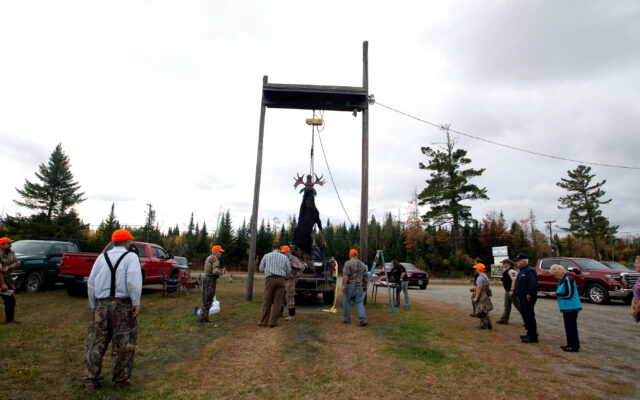
Here are the changes to this year’s moose hunting season
By Pete Warner, Bangor Daily News Staff
There will be some minor changes to this year’s moose hunting season.
Citing feedback from the public and entities such as the Maine Professional Guides Association, the Maine Department of Inland Fisheries and Wildlife intends to withdraw its plan to conduct three separate two-week hunts during the adaptive moose hunt, it announced during Tuesday’s meeting of the DIF&W Advisory Council. Hunters participating in the regular statewide hunt have only six days to harvest a moose.
Instead, the state will offer unsuccessful adaptive hunt participants in any of the first three weeks (Oct. 16-21, Oct. 23-28, Oct. 30-Nov. 4) the opportunity to return to Wildlife Management District 4A during the week of Nov. 6-11.
The original proposal arose because last year’s adaptive hunt produced an overall harvest rate of only 26 percent, the state’s second year using the model. The adaptive hunt is an experiment through which state biologists are trying to determine if lowering moose density through the harvest of more cows and calves might lessen the threat of moose mortality from winter ticks.
That was a significant drop from 52 percent hunter success during the inaugural adaptive hunt in 2021. Thus far, 389 cows and calves have been harvested from the 1,000-square-mile zone.
“It’s a short season to do everything we want to do,” said DIF&W moose biologist Lee Kantar. “The difficult part of the adaptive hunt is, it’s a scientific endeavor that’s being logistically put out as a general hunt. That’s a challenge.”
The state lowered the total number of available permits for the adaptive hunt from 600 to 550 as a result of the changes.
The department also withdrew a proposal that would have changed the antlerless portion of the statewide moose hunt from the fourth week to the third week of October. Guides and sporting camp owners said implementing such a change at this point in the year would make it difficult for them to adjust their schedules.
The state will likely revisit that idea in the future.
The department did move forward with its proposal to expand the model that has allowed hunters selected in WMD 27 or WMD 28 to shoot a moose in either zone. This year, it also will pair WMDs 7 and 13 (140 antlered permits), WMDs 12 and 15 (40 antlered permits), and WMDs 14 and 17 (40 antlered permits) under the same rule.
Biologists believe the change will provide more opportunities to hunt and increase the harvest in places where moose are less plentiful and harvest numbers are generally low.
The deadline to submit a moose hunt application is 11:59 p.m. on May 15. That process must be done online by visiting the DIF&W website.
The permit winners will be announced during a live reading of the names scheduled to begin at 2 p.m. on June 10 at Mill Park in Augusta.